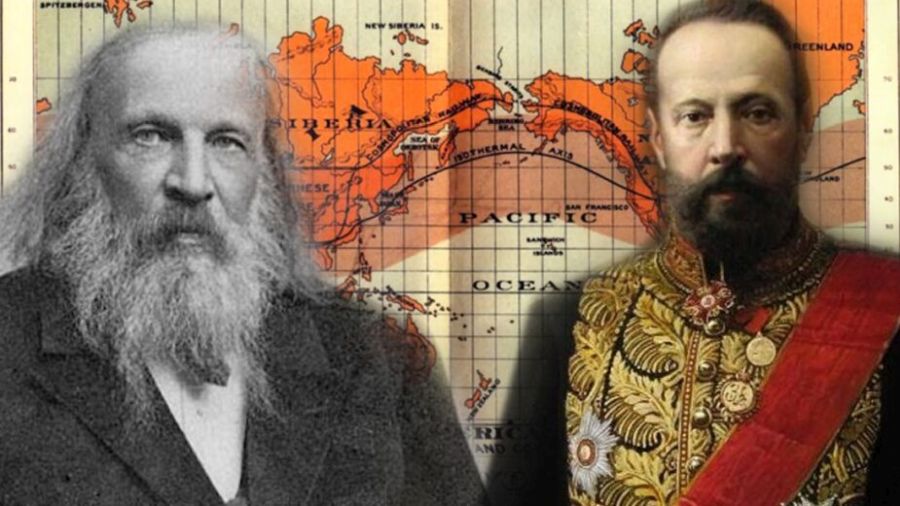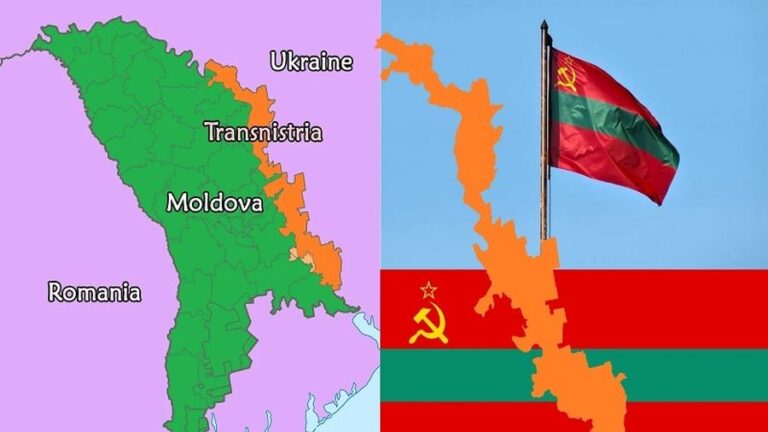Mendeleyev, Witte and the Revival of Russia’s Lost Revolutionary Potential of 1905
The biosphere’s limits only dominate humanity’s destiny when we permit the law of the jungle, rather than the law of civilization, to shape our world… as all empires demand be so.
In my last article in this history series, I attempted to shed some light on President Putin’s reasons for claiming the Bolshevik Revolution did significantly more harm than good to humanity over a century ago.
My primary intention in that location was to demonstrate that revolutionary the events of 1905 and again in 1917 had many characteristics of a foreign-directed regime change which disrupted a true revolutionary process then coming into being.
In this sequel I would like to delve more deeply into the 1867-1905 period of vast revolutionary potential that swept across the globe which the counter-revolution of 1905 and 1917 de-railed.
A Revolutionary Process Blossoms
The late 19th century was shaped, in large measure, by the growing U.S.-Russian alliance which saved the USA from dissolution during its Civil War. Masterful diplomacy at the time resulted in Czar Alexander II deploying the Russian navy to assist Lincoln in his efforts to preserve the Union with a direct message to both England and France that any direct effort to join the confederacy in war against Lincoln would be seen as casus belli by the Russians. This U.S.-Russian alliance again amplified its force in 1867 when Russian statesmen arranged the sale of Alaska to the republic with the aim of extending telegraph lines and rail through the Americas and across the Bering Strait by the end of that century. By 1890, pro-American networks in Russia had finally launched the construction of the Trans Siberian Railway which was to soon carry Baldwin locomotives produced in Philadelphia across a 9289 km expansive rugged terrain.
But despite the setback of murdered leaders Abraham Lincoln, James Garfield and Czar Alexander II, the momentum behind the growth of a multipolar international alliance of nations continued to grow. In 1890, Colorado Gov. William Gilpin’s designs for a cosmopolitan railway stretching across all nations of earth presented a beautiful vision of the world then coming into being.

In Russia, Finance Minister Sergei Witte led a network of nation builders who worked closely with like-minded collaborators in France, Germany, China and the USA (1).
The common denominators among these nationalist movements were: 1) the application of protectionism to develop native manufacturing sectors, 2) the use of national banking/productive credit, 3) large scale infrastructure projects, 4) an emphasis on education/science and 5) railroad construction to accelerate interconnectivity within and between cooperating nations.
In all cases, British Free Trade, speculation and usury were completely rejected in favor of this superior system of political economy.
As historian William Jones has outlined in his voluminous writings on the subject and showcased in this seminal 1995 lecture, It was Witte, who as Finance Minister from 1891-1903, overhauled the Russian economy, banned free trade in favor of Protectionism (2), brought stability to the ruble by ending speculation by pegging the ruble to gold, and lowered interest rates to favor internal development. He additionally imposed strict controls on foreign direct investments ensuring that his ministry (and not ill willed London-based money lenders) stayed in control of Russia’s economic policies.
With a stabilized currency that won the confidence of international investors, Witte also created a new system of national banking with each new rail station along the Trans Siberian line authorized to institute a bank branch in order to facilitate lending to citizens and industry. The great underdeveloped Siberia and Arctic awoke a form of Russian ‘Manifest Destiny’ and Witte aimed to develop its full potential guided by a similar spirit that guided the best of American System patriots in the 19th century and even the Chinese ambitions to “go west” today.

This positive conception of manifest destiny is not at all tied to the exploitation, and imperialism as is commonly taught, but rather the creative overcoming of limits to growth by a spiritual-intellectual and economic extension of the best of civilization driven by a love for scientific and technological progress.
Dimitry Mendeleyev: Scientist and Nation Builder
Witte set up over 100 new commercial and technical schools across Russia with the help of his close collaborator Dimitry Mendeleyev who not only discovered the table of elements that bears his name but also headed the Committee on the Protective Tariff. Throughout his writings and speeches stretching across 40 years of public service, Mendeleyev promoted a new renaissance culture of citizen scientists. He also polemicized against Adam Smith’s free trade which he likened to the absurd belief in a mysterious substance called “phlogiston” which scientists once believed to be the cause of rust.
Attacking the religious devotion to British Free trade permeating the Russian elite, Mendeleyev wrote in his 1891 Tariff Report:
“I consider it my duty, partly in defense of truly contemporary, progressing science, to say openly and loudly that I stand for rational protectionism. Free tradism as a doctrine is very shaky; the free trade form of activity suits only countries that have already consolidated their manufacturing industry; protectionism as an absolute doctrine is the same sort of nonsense as free trade absolutism; and the protectionist mode of activity is perfectly appropriate now for Russia, as it was for England in its time.” (3)
Mendeleyev was part of the Russian delegation that visited the USA during the 1876 Centennial Exposition organized by Lincoln’s economic advisor Henry C. Carey and which showcased the scientific and industrial accomplishments made possible by the young republic in its first 100 years.

Upon his return to Russia, Mendeleyev championed this system serving as executive director of the Southwestern Railway Company and head of the rail department in the Finance Ministry working closely with Finance Minister Ivan A. Vyshnegradsky. He was simultaneously appointed the scientist to head the Bureau of Weights and Standards where he brought in the metric system to Russia and also led the assessment of mineral potential of Russia’s far east which played a vital role in Russia’s development over the coming century.
Mendeleyev attacked those who asserted that humanity could only adapt to the limits that nature put upon us writing: “The philosophy of Jean-Jacques Rouseau… for a ‘back to nature’ existence, is semi childish. Because in a patriarchical society, as well as among higher animals there is a definite limit to growth, but human beings taken as a whole, recognize no such limit”.
Mendeleyev understood that the only way to avoid the destructive effects of Marxist revolutionary chaos was through the uplifting of all citizens through physical, intellectual and spiritual progress. Writing in his Principles of Chemistry, Mendeleyev said: “Chemistry is closely connected with the work of the manufacturer and the artisan. It is a useful part and is a means of promoting the general welfare. In that pure enjoyment experienced on approaching to the ideal, in eagerness to draw aside the veil from the hidden truth and even in that discord which exists between the various workers, we ought to see the surest pledges for further scientific progress.”
Peace Abroad and Progress at Home
The work of Witte and Mendeleyev paid off and by 1900, the Russian rail industry employed 400,000 people directly with millions in secondary and tertiary sectors which went far to pull Russian society out of destitution (7/8th of the population lived on subsistence levels in 1890). Between 1892-1903, Coal production in the Donets Basin tripled, pig iron production tripled and oil, chemical and metallurgical industries blossomed.
Between 1892-1901, 14,814 miles of rail were built (compared to 5466 miles between 1879-1892). Grain imports from Siberia grew from 10,000 tons to 70,000 tons in the same time frame.
Witte worked arduously to ensure treaties of win-win cooperation to break free of British intrigue exemplified by the 1895 Russo-Chinese Bank and Chinese Eastern Railroad both of which involved strong cooperation with Foreign Minister Gabriel Hanotaux’s France. Witte, Hanotaux and their German collaborators loyal to Bismarck’s strategic outlook always focused their efforts on a cooperative entente needed to avoid falling into British traps that could trigger a bloodbath.
Witte had indicated his deep insight into the nature of the Great Game in a 1897 letter to Kaiser Wilhelm- extolling the leader to sign a peace treaty with Russia which would have created a Russian-German-French continental alliance for progress in order to avert a coming storm. In his letter, Witte wrote:
“Imagine, your majesty, the European countries united in one entity, one that does not waste vast sums of money, resources, blood and labor on rivalry among themselves, no longer compelled to maintain armies for war among themselves, no longer forming an armed camp, as is the case now, with each fearing his neighbor. If that were done, Europe would be much richer, much stronger, more civilized, not going downhill under the weight of mutual hatred, rivalry and war… BUT if European countries continue on their present course, they will risk great misfortune.”
Friedrich List’s American System in Russia
This system was directly informed by the works of nationalist economist Friedrich List whose incredibly popular writings guided Russia’s strategic thinking to a much higher degree than anything found in either extremes of Adam Smith or Karl Marx.
Witte himself oversaw the translation of List’s ‘National System of Political Economy’ in 1891 whereby he ensured that List became a guiding light for all economists and administrators under his watch.
Having coined the term “American System of Political Economy” after his five-year tour of the USA from 1825-1830, Friedrich List became a global champion of progress spearheading the creation of the German Zollverein (aka: ‘Customs’ Union) and polemicizing relentlessly against British Free Trade. List’s understanding of economics was exemplified in this quote often cited by Witte:
“The more rapidly the genius of discovery and industrial improvement as well as of social and political progress advances, the more rapidly is the distance between stationary nations and those which are progressively increased, and the greater is the peril of remaining behind.”
These nation-building statesmen knew there were two opposing approaches to resolving the mechanism of “class struggle”: 1) violent revolution of the proletariat or 2) the fostering of scientific and technological progress guided by win-win cooperation and a human centered development around a harmony of interests.
The philosophy animating this outlook was summed up Witte’s statement “with the investment in industry, the powerful stimulus of personal interest calls forth such curiosity and love of learning as to make an illiterate peasant into a railway builder, a bold and progressive organizer of industry and a versatile financier.”
Looking at rail construction as far more than merely “infrastructure”, Witte saw it as a civilizing force saying in 1890: “The railroad is like a leaven, which creates a cultural fermentation among the population. Even if it passed through an absolutely wild people along its way, it would raise them in a short time to the level requisite for its operation.”
When asked what ideological box he fit into, Witte wrote: “I am neither a liberal nor conservative; I am simply a civilized man. I cannot send someone to Siberia simply because he doesn’t think as I do and I cannot take away his civil rights simply because he does not worship God in the same Church as I.”
Years later, Witte described how he overcame insurmountable odds in the early years of his administration saying: “Faced by a serious shortage of locomotives, I invented and applied the traffic system which had long been in practice in the United States and which is now known as the “American system.”
The British Empire which always relied on keeping nations divided, underdeveloped and dependent on the use of maritime shipping was not amused.
The British System Strikes
By controlling the international maritime choke points, the tiny island was able to exert its influence across the globe as a hegemon for over two centuries.
Through the vigorous enforcement of laissez-faire doctrines of free trade, nations were blocked from protecting themselves from the financial warfare launched by the city of London against victim states. This financial warfare took many forms ranging from speculative attacks, usurious money lending, the dumping of cheap goods in order to crush local manufacturing, cash cropping and even drug running.
Anyone wishing to engage in long term planning in the building up of the land-based transport corridors via rail, roads and industry would be easily sabotaged if the British System were dominating their economies.
Despite the fact that the Trans-Siberian railway was completed in 1905, a British-manipulated Japanese-Russian War (from 1904-05) devastated the economy as nearly the entire Russian navy.
Not only did $200 million in loans by financier Jacob Schiff grease the wheels of war, but the Anglo-Japanese Alliance of 1902 guaranteed that the militarily advanced Japanese would find an easy victory over Russia as the treaty guaranteed British military support for Japan if any second party joined to assist Russia. On May 28, 1905, two thirds of the Russian fleet was destroyed at the Battle of Tsushima Strait and all hopes for Siberian-Pacific trade routes came undone.
With this defeat, the planned trajectory for Witte’s hopes for industrialization quickly came undone and the world began its slide into the first of a series of wars and color revolutions that would litter the 20th century.
Witte Returns
Amidst the devastation of the war, a short-lived effort was made by saner advisors of Czar Nicholas II including Grand Duke Nikolai Romanov and the Czar’s mother, to bring Witte back into a position of authority after having been foolishly fired in 1903 (4). These figures understood that Witte was the statesman most qualified to get Russia out of its race into chaos which she found herself locked into.
Witte’s first task as Prime Minister was to solidify a peace treaty with Japan with as few concessions as possible to the defeated Russia. His second major task was to carry out sweeping constitutional reforms needed to avert the emerging revolutionary fervor of millions of Russians then being organized by the likes of Trotsky, Lenin, Parvus and a vast array of London-directed revolutionaries. (5)
Witte commented on his new assignment saying: “when a sewer has to be cleaned, they send Witte. But as soon as work of a cleaner and nicer kind appears, plenty of other candidates spring up”.
Witte accomplished the first task returning to Russia from months of negotiations in the USA as a hero. Upon his return he lost no time authoring the October Manifesto of 1905 which called for sweeping changes of every aspect of Russian governance. Pushing back against those who wished to violently suppress all protest movements, Witte insightfully said:
“The present movement for freedom is not of new birth. Its roots are imbedded in centuries of Russian history. Freedom must become the slogan of the government. No other possibility for the salvation of the state exists. The march of historical progress cannot be halted. The idea of civil liberty will triumph if not through reform then by the path of revolution. The government must be ready to proceed along constitutional lines. The government must sincerely and openly strive for the well-being of the state and not endeavour to protect this or that type of government. There is no alternative. The government must either place itself at the head of the movement which has gripped the country or it must relinquish it to the elementary forces to tear it to pieces.”
This manifesto of October 30, 1905 professed to transform Russia into a constitutional monarchy, expanded civil rights for all citizens, guaranteeing freedom of the press, freedom of association, the right to vote, the right to form trade unions and the creation of the first Duma. Witte also pushed for vast land reform to give peasants the power to own and operate their own land.
However, all of these reforms were rejected by the growing revolutionary organizations which chose to push for regime change.
Witte’s enemies in the court used this instability to arrange his firing in April 1906 and soon an iron fist came cracking down upon the rebellious population (anarchist provocateurs and innocents alike) giving rise to new revengiste grievances that would escalate to a boiling point within the coming decade. To get a sense of the tension of the times, between 1905-1916, hundreds of assassinations and terrorist attacks launched by the terrorist cells like “The Black Hundreds” resulted in tens of thousands of dead, including hundreds of Russian politicians. Witte and his heavy-handed successor Peter Stolypin narrowly surviving several attempts which took place in 1906 (6) (Stolypin eventually being killed in 1911).
The Tragic Fall and Hopeful Renewal of Creativity in Statecraft
Sadly, the flowering of the new system of cooperating nation states under a community of progress and common interest was annihilated by a dense array of assassinations, color revolutions and endless wars.
The Witte-Mendeleyev aborted system was fundamentally anti-Malthusian/anti-closed system and tied to the constant self-improvement of the nation and its people. It was never “left” nor “right” according to any conventional definitions given to us following the Marxist/Communist vs Liberal/Capitalist dichotomy.
This system did not then, nor does it now dichotomize the freedom of the individual citizen from the wellbeing of the whole society. It was and is fundamentally driven by a concept of humanity as a species made in the image of a living Creator capable of conceptualizing and then transcending the relative limits to growth which press upon our potential at all stages of society. This system recognizes that these limits are only caused by limits of knowledge and morality. The tension between these two systems: open vs closed/ multipolar vs unipolar has been at the heart of history including the causes of the Bolshevik color revolution.
While representatives of this better tradition have sadly fallen from sight among nations of the Trans Atlantic rules-based liberal order, a re-appearance of this quality of statecraft has begun to be revived among Eurasian leaders.
One prominent leading figure among this renewal is made evident in the recent remarks by renowned Russian economist and EEC leader, Sergey Glazyev who said in an interview titled “Ideas Rule the World”:
“For many centuries Russia, fighting for a place under the sun in this world, showed miracles of self-sacrifice, miracles of building new meanings. And when these new meanings penetrate people’s souls, a boom arises in society, an opportunity arises to create new things and be “ahead of the rest of the planet.” This remarkable ability or ability to overcome difficulties is, in my opinion, the first component of that deep ideology that is inherent in the entire Russian people. They are not afraid of difficulties and sometimes even “create difficulties and then heroically overcome them.” But, regardless of whether we ourselves create these difficulties by ourselves or our “partners” help us in this, we must understand that the difficulties have been, are and always will be. The theory of long-term economic development, which I am currently pursuing, shows that as human society develops, limits to growth appear, periods of stagnation and threats to the development of humanity’s very existence appear, which must be overcome. The principle of overcoming these limits, difficulties, threats, fighting for something new, positive, creating new opportunities for the development not only of Russia, but of all humanity : this, I believe, is the key principle of ideology that lies in the depths of the Russian character.”
Glazyev was here making the important point that the specific set of ideas which must govern Russia going into the future storm must have certain universal characteristics.
These characteristics are not limited to Russian experience, but are applicable to all societies and are driven, as Glazyev noted, by the mandate to constantly overcome our limits to growth. This is done specifically by increasing the rates of creative leaps, guided by reason and conscience into ever richer forms of discoveries of those invisible causal laws that organize the universe. As discoveries are made through the fostering of scientific progress, new opportunities to translate those ideas into technological progress must be advanced without any assumed end point in this process.
Just as Lincoln, Witte, Mendeleyev and countless great statesmen of the past understood, it is this principled element of the human condition that sets our species apart from and above all other species in the biosphere. The biosphere’s limits only dominate humanity’s destiny when we permit the law of the jungle, rather than the law of civilization, to shape our world… as all empires demand be so.
Notes
(1) Leaders of this process in France included President Carnot and Foreign Minister Hanotaux, in Germany, it was led by Chancellor Otto von Bismarck and industrialist Emil Rathenau, while President William McKinley and Secretary of State James Blaine championed Lincoln’s system in the USA against the growing rot of an anglophile deep state
(2) With a protective tariff favoring rail development in 1889 followed by a broader protective tariff in 1891
(3) Mendeleyev’s 1891 Tariff Report citation is taken from SCIENTIST-STATESMAN FOUGHT BRITISH “FREE TRADE” IN RUSSIA by Barbara Frazier, EIR, January 1992
(4) The effect of slanders and court gossip that Witte was “a Rothschild shill” led to the Czar’s hasty decision to fire him. This gossip spread through the courts by Sergei Nilus (confessor of the Czar), Interior Minister Cyacheslav Plehve and even Czarina Hesse-Darmstadt herself fueled this hysteria. The material used to drive the slander was fueled by the work of International Okhrana chief Peter Ivanovich Rachkovsky, Russian Okhrana-chief Sergey Zubatov, and Protocols of Zion author Matvei Golovinsky (who worked for Rachkovsky and later became a leading figure of the Bolshevik revolution). This forgery fueled the fires of anti-Jewish paranoia across the minds of the European elite during these dark days. Proof of the Protocols hoax is told in Eric Bronner’s The Tale of a Forgery: Inventing the Protocols: Conspiracy, Anti-Semitism, and the Protocols of Zion, 2019
(5) Many of these forces, who would increasingly rely on terrorist tactics, often found a strange source of support among controllers of the Russian Secret Police known as the Okhrana who tended to work on behalf of the confused and frightened czar as the Jesuit order worked with the often bewildered papacy.
(6) The Black Hundreds was a paramilitary operation interfacing closely with the Okhrana which was find to be tied to two assassination attempts made on Witte in 1906. After a bomb killed 27 people including two of his children, Stolypin stated: “They will kill me, and those will be members of the Okhranka [secret political police]”









